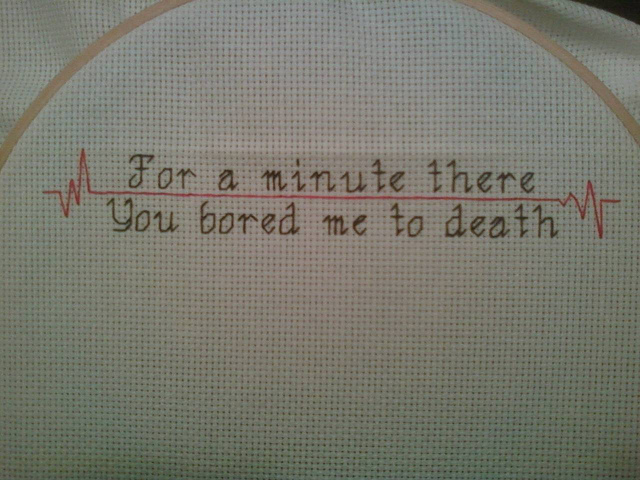
Feature Image Source: Kevin Simmons – Dating (Flicker: https://goo.gl/QnYUei )
Why did I let Sophie talk me into this?
This is dreadful.
Do you have a pet?
No.
Are you close with your family?
Sort of.
Sort of! What kind of answer is that?
Ugh – Will this ever end?
Do you like your job?
Yes, I do.
Riveting, just riveting.
I’ve officially become a real life bobble head.
Mission control, eyebrows and cheesy smile are ready for takeoff.
What do you like to do in your spare time?
Hike.
Oh good here comes our food.
Please be our food.
No! Over here you’re going the wrong way.
That’s it, I’m going to the washroom.
Maybe if I’m lucky there will be a window I can climb out of.
If nothing else maybe our food will be here by the time I get back.
The power of the question.
 Image Source: airpix – question (Flicker: http://goo.gl/mHWAlO)
Image Source: airpix – question (Flicker: http://goo.gl/mHWAlO)
Asking the right questions in the dating world is imperative. Especially if you don’t want to find yourself sitting alone as your date attempts to shimmy themselves out a bathroom window or slip out the back door as you tell the server “oh, I’m sure they will just be a few more minutes, I’ll wait to order dessert.”
Sorry my friend, it appears you will not be having dessert tonight.
It all comes down to:
Engagement
Motivation
Desire
After reading this week’s, modules I would argue that the act of seeking out a relationship and inquiry based learning go hand-in-hand.
I have come to learn that inquiry based learning is collaborative. Relationships are collaboartive.
Many of you would deny it, claiming “I don’t talk about my relationships with others.” We both know that is a LIE! I understand the desire to want to cover this fact up, simply because some topics surrounding our relationships are at times perhaps a bit more collaborative than they need or should be. I dare you however, to try and name a relationships where you didn’t seek the input and dialogue and collaborative perspectives of others. I would continue to argue that, even if you are presently in a committed long term relationship you still enter collaborative conversations to generate ways to problem solve and find answers.
Relationships are collaborative.
I am calling Sophie the second I get to the bathroom.
I wonder what she was thinking!?
Inquiry requires one to draw upon their background knowledge to define a reference point of where to begin.
Dating requires you to reflect on your background knowledge to define what experiences you have had, and which paths you don’t necessarily need to travel again.
Inquiry demands that each individual ask questions that promote curiosity, excitement, interest, and a desire to stay engaged.
Relationships, at all stages, demand that each individual ask questions that promote curiosity, excitement, interest, and a desire to stay engaged.
Otherwise, you might as well have spent the hour getting ready to sit at home.
Feeling fabulous and looking fabulous doesn’t amount to much when your brain has
CHECKED-OUT.
You might as well have gotten dressed up to sit on the couch aimlessly navigating the internet while watching re-runs.
Disconnected and unengaged.
Our dater above is thinking of climbing out a window to escape her terribly unengaging situation! She is putting more effort into thinking about anything other than what has been presented in front of her.
Image Source: Whateverjames – Bored (Flicker: http://goo.gl/SHlYag )
Hmm. I can name a few students that have behaved in a very similar fashion. They have “checked-out” do to the nature of my lack luster teacher directed questions.
If I plunked my student-teacher scenario into a dating world, I am certain my number would be deleted or it would be dropped in the nearest garbage on the way out.
Yikes!
That is a pretty harsh reality.
Uninterested, unmotivated, disengaged daters.
Uninterested, unmotivated, disengaged learners.
Inquiry based learning and dating have uncanny parallels.
If essential questions are not asked, the dater is not getting a second date and you as a teacher are going to see students who are glassy eyed, eyebrows furrowed, nervous smiles and the quick “yes” to the question you just asked. “Yes!? That doesn’t even make sense to what I just asked.”
Jeffery D. Wilhelm writes that “essential questions should:
- Matter to the students
- Connect to students’ current lives
- Be about quality and require students to make judgements
- Get to the heart of the matter
- Possess emotive force
- Be open-ended, debatable, possible to contend, arguable
- Be linked to data
- Be concise and clearly stated” (pg. 38)
Daters and students are seeking the same questions.
Only by using these style of questions, will the dater and the students, be able to move about their sticky-notes of understanding and misconceptions (Fontichiaro, K. & Green, J., 2010) and feel satisfied and interested in engaging in it for a second date or day.
Without this style of questioning, each party enters into what I muse is a speed dating type scenario. Quick rapid fire questions dictated by the looming timer. Disengaged and putting little effort into answering the questions. Why, because everyone has learned that when the timer goes you are just going to pick up and move on. There is no sense of urgency to invest in it (Rothstein D. & Santana L., 2011).

Image Source: Michael Crane – Speed dating jelly babies (Flicker: https://goo.gl/tuqWW4 )
At its core, this speed date approach to questioning is not only surface level but superficial. It is impersonal and has little to hold on to.
Well at least Susie came with me this time.
“I like dogs over cats”
Ooh, he’s cute how many times does the timer go.
“Really, you have a dog”
Will he make it to my table?
Disengaged – Distracted – Doesn’t Care
It is time to toss out the speed dating and the online dating profile. The cut and paste approach to seeking information. All that is represented here is what the individual thinks you want to see and hear, not the information that is relevant and important to them. Ultimately leading to misinformation and a cut and paste approach.
His profile doesn’t match what I’m seeing at all.
Im pretty sure he made that all up or just copied of someone else profile. Ha.
Instead it is time to add a matchmaker. The person who will work with you to refine your understanding and push you in the right direction, to broaden your horizon in the dating realm. Someone who will help you understand the value in the process over the product (personality and contribution to conversation over looks). Someone who will lead the dater “into the shades of grey, the ambiguity or uncertainties of knowing, to places where they will need to be able to reflect and think critically…while they leave the door open for more (Ekdahl M., 2017).”
Ultimately, if done so correctly it shall lead to one very satisfied dater experiencing a whole new realm in the shades of grey. Engagement, satisfaction and forever seeking more.

Image Source: minm01 – Dating (Flicker: https://goo.gl/bPN0FG )
Readings that have influenced this reflection:
Module 7
Ekdal M. (2017). Module 7: Inquiry learning by design and/or re-design [class handout].
Sessional Instructor Department of Language and Literacy Education, University of
British Columbia, Vancouver, BC.
Fontichiaro, K. (2015a). Nudging toward inquiry – Framing inquiry with scenarios. School
Library Monthly 31(3): 50-51.
Pentland, C. (2010). Nudging research towards critical thinking. School Library Monthly
26(10): 10-12.
Wiggins, G. (2005). Understanding by design: Overview of Ubd & the design template.
Authentic Education
Zmuda, A. (2013). CCSS (Commmon Core State Standards): A window and fresh air for
learning. School Library Monthly 29(4): 9-12.
Module 8
Ekdal M. (2017). Module 8: Driving inquiry with questions [class handout]. Sessional
Instructor Department of Language and Literacy Education, University of British
Columbia, Vancouver, BC.
Fontichiaro, K. & Green, J. (2010). Jump-start inquiry: How students begin when they
don’t know. School Library Monthly 26(5): 22-23.
Koechlin, C. & Zwaan, S. (2007). Power up your inquiry questions. Q Tasks: How to
empower students to ask questions and care about answers (p.73). Markham, On:
Pembroke
Rothstein, D. & Santana, L. (2011). Teachins students to ask their own questions: One
small change can yield big results. Harvard Education Letter 27(5): 1-2. Cambridge,
MA: Harvard Education Publishing.
Wilhelm, J.D. (2014). Learning to love the questions. Knowledge Quest 42(5): 36-41.
